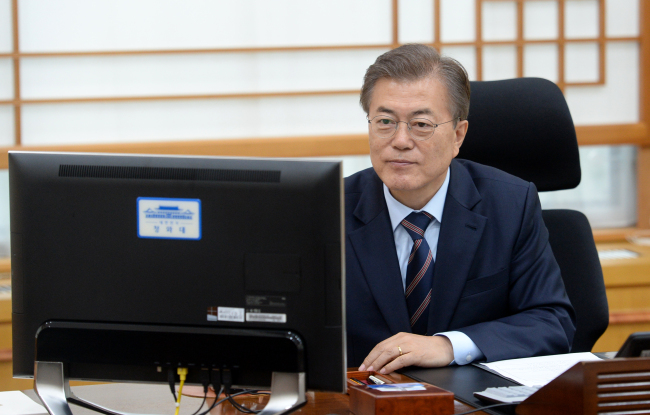[Moon in Office] Big retailers brace for restrictions
Experts, SMEs say current limits do little to boost their sales
By Korea HeraldPublished : May 17, 2017 - 15:03
The Korea Herald is publishing a series of articles delving into the economic policies and tasks expected of the new Moon Jae-in administration. This is the fifth installment -- Ed.
Big retailers in Korea are cautiously watching the new Moon Jae-in administration, with many anticipating more restrictions in the operations of large-scale outlets.
On the campaign trail leading up to the election, Moon had been vocal about his belief in the need for government intervention to create a “level playing field” in the retail market.
Big retailers in Korea are cautiously watching the new Moon Jae-in administration, with many anticipating more restrictions in the operations of large-scale outlets.
On the campaign trail leading up to the election, Moon had been vocal about his belief in the need for government intervention to create a “level playing field” in the retail market.

“The chaebol and large retail companies have crippled small businesses and traditional markets to hurt small business owners,” he said. “I will work to protect traditional markets and small businesses, and prevent unfair practices to help raise sales for small business owners.”
In particular, Moon specifically mentioned as his target large shopping malls that combine shopping with entertainment and leisure facilities, such as Shinsegae’s Starfield Hanam and Lotte’s Lotte World Mall.
Under Moon’s plans, new shopping malls will have to face more rigorous vetting regarding their impact on surrounding businesses before they can be constructed.
The new administration’s stance regarding retail has been cited as one of the reasons that Shinsegae’s most recent plans to construct a department store in Bucheon, a city just outside of Seoul, were put on indefinite hold last week after facing opposition from local vendors.
One of the possible new restrictions may be for big retail complexes to close on two non-business days each month, according to industry watchers. Hypermarkets and so-called “super supermarkets” run by large retailers are already under this regulation.
“It has been five years since those regulations went into effect, but we have not seen the benefits to smaller businesses or traditional markets,” said Seol Do-won, vice chairman of the Korea Chain Store Association. “Rather than trying to create artificial effects through law, it will be more effective to have large retailers and smaller businesses work together to create a win-win model that can benefit both sides.”
Analysts from firms such as Hana Financial Investment estimate that just about 30 percent of the lost sales from closed supermarkets have gone to small businesses or traditional markets. With the convenience of online shopping, consumers are less impacted by operating hours than expected.
“We absolutely agree that we must work with small businesses in our area to work toward a sustainable model,” said a source from a large retailer. “We have been trying to do our part. However, putting penalties on large retailers or not allowing us to operate on certain days does not help anyone. Consumers will just wait a day to go shopping, or buy larger quantities the day before.”
The ineffectiveness of these types of restrictions in helping smaller businesses, particularly when it comes to large-scale shopping malls, was echoed from the other side as well.
“To be honest, there is no real difference to our business whether or not a mall stays open nearby,” said 57-year-old Lee Soo-ja, who runs a womenswear store in Namdaemun Market. “We just want big companies to do their part by offering support to nearby small businesses or partnering together to do things. We can’t force customers to come here even if the supermarkets and malls are closed.”
Big retailers also point to the fact that large shopping malls attract clientele that is different from smaller markets to begin with.
“Especially in the case of malls, we can’t ignore the fact that many of the people who come are tourists,” said a representative with a company that operates a mall in Seoul. “If the mall is closed, that tourist isn’t going to head to a small market instead. It would be better if traditional markets and small businesses could find a way to brand themselves as a destination of their own.”
Another campaign promise made by Moon was that he would raise the minimum wage to 10,000 won ($8.90) per hour from the current 6,470 won by 2020. The convenience store industry, which utilizes a large number of minimum-wage employees, is expected to take a hit.
“We have always tried to refrain from opening more stores than we can manage,” said a spokesperson for 7-Eleven when asked about the potential impact of the minimum wage on new outlets. “Even as the minimum wage rises, we have been focusing on increasing revenues through innovative products and great service.”
For now, retailers say that there has not been any significant impact on their day-to-day business, but that they are monitoring the administration’s policies carefully.
“President Moon made certain promises to the people before being elected and we expect him to follow through on those promises,” one spokesperson said. “We do not think he should renege. However, we hope that he will be open to discussions with industry leaders as well, to make sure that we move forward together.”
By Won Ho-jung (hjwon@heraldcorp.com)
-
Articles by Korea Herald







![[Graphic News] More Koreans say they plan long-distance trips this year](http://res.heraldm.com/phpwas/restmb_idxmake.php?idx=644&simg=/content/image/2024/04/17/20240417050828_0.gif&u=)
![[KH Explains] Hyundai's full hybrid edge to pay off amid slow transition to pure EVs](http://res.heraldm.com/phpwas/restmb_idxmake.php?idx=644&simg=/content/image/2024/04/18/20240418050645_0.jpg&u=20240419100350)






![[From the Scene] Monks, Buddhists hail return of remains of Buddhas](http://res.heraldm.com/phpwas/restmb_idxmake.php?idx=652&simg=/content/image/2024/04/19/20240419050617_0.jpg&u=20240419175937)

![[KH Explains] Hyundai's full hybrid edge to pay off amid slow transition to pure EVs](http://res.heraldm.com/phpwas/restmb_idxmake.php?idx=652&simg=/content/image/2024/04/18/20240418050645_0.jpg&u=20240419100350)

![[Today’s K-pop] Illit drops debut single remix](http://res.heraldm.com/phpwas/restmb_idxmake.php?idx=642&simg=/content/image/2024/04/19/20240419050612_0.jpg&u=)